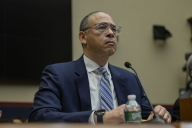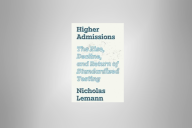You have /5 articles left.
Sign up for a free account or log in.

NicolasMcComber/E+/Getty Images
Tuition-free college programs are not always accessible to adult learners, and even the programs that are open to older students can include requirements that pose barriers, according to a recent report from the American Institutes for Research.
The report examines 67 programs across the country that are open to adult students and fully cover tuition for the traditional amount of time it takes to earn a certificate or degree. Only 22 states, plus Washington, D.C., had options that were open to older adults and tuition-free. A mere 15 programs were available statewide. Most of the programs, 85 percent, included at least one public two-year institution option, and 27 percent of programs included at least one public four-year college option.
Alexandria Walton Radford, co-author of the report and director of the Center for Applied Research in Postsecondary Education at AIR, said she was surprised there were so few tuition-free programs available to adults out of hundreds of tuition-free college programs nationwide.
“There’s definitely a movement towards doing more free-college tuition programs,” Radford said. “There’s increased political interest in these programs as well, and we know that there’s a need for Americans to have more postsecondary training in order to have more opportunities in the labor market … If we’re really going to reach our postsecondary attainment goals, you can’t leave out adults. We won’t get there by just getting more recent high school graduates to enroll.”
Michelle Miller-Adams, a professor of political science at Grand Valley State University in Michigan and a senior researcher at the Upjohn Institute for Employment Research, said when the free college movement began, its proponents were primarily focused on the transition from high school to college. Considering the needs of adults in these programs is a “newer idea,” but she sees the grassroots and national conversations around these programs starting to expand.
“I think the idea that you could use this free-college messaging as a tool to get adults to reconnect with higher ed is a more recent recognition than that focus on traditional high school students,” she said.
Among the tuition-free college programs that enroll adults, fewer than half were open to students who had some college credits but never finished a degree, which leaves out 20 percent of adults age 25 and older, the report found. Only 18 of these programs allowed students to enroll part-time, even though 63 percent of financially independent college-goers were part-time students, according to a recent National Postsecondary Student Aid Study.
The report categorized programs as “adult friendly” if they were open to adults who enroll as part-time students or adults who come into the program with some college experience.
The Achieve Your Degree program at Ivy Tech Community College in Indiana was listed as an adult-friendly example. The college partners with local employers, such as Amazon and the United Postal Service, to enroll employees wanting to learn new skills and earn credentials that allow them to seek higher-paid positions at their companies. Representatives from the college visit company offices to help students fill out the application for financial aid and enroll so they can avoid having to make a trip to campus. Companies pay for their employees’ tuition at the end of each semester, guaranteeing companies only need to pay once students complete the term.
If colleges are looking to enroll adults, most of them are in the workforce, said Chris Lowery, senior vice president of workforce, careers and adult strategy at Ivy Tech. He noted that the program comes at no cost to students and is designed to be as easy as possible for adults with “crazy-busy” lives and financial responsibilities.
“I don’t think any of this is rocket science, but I do think it’s stepping back and talking with adults and saying, ‘So, what are your challenges?’” he said. “I think these are the kinds of challenges where we don’t have to move the earth to be more adult-centric and adult friendly.”
Radford said she hopes the designers of tuition-free college programs will read the report and consider how their entry requirements bar a significant portion of adult students from participating.
When policy makers develop state programs, many “are coming from a perspective of their postsecondary experience, where they tend to be recent high school graduates, where they tend to have attended full-time themselves,” she said. “I think that can color folks’ perspective as they’re shaping these programs.”
Tuition-free programs were also subject to other requirements that could potentially pose obstacles to adults. About 76 percent of adult-eligible options needed students to meet certain academic requirements to stay in the program. Only nine programs required them to pursue specific and usually high-demand fields, though it was twice as common among adult-friendly programs. Some, though relatively few, had postgraduation requirements. Six programs required participants to live in a specific place or meet some kind of work requirement, or both, after graduation.
Miller-Adams, of Grand Valley State, described herself as “generally anti-requirements when it comes to the design of these programs.”
“You just don’t need that stuff if you’re really trying to broaden that pipeline and encompass more students coming into the program,” she said.
She noted that states, and specifically the communities surrounding colleges, benefit from tuition-free college programs that serve adults because adults are more likely to stay and work in the area, unlike younger graduates.
“They already have roots in that community,” she said. “They’re not all that likely to get a degree and leave. They’re more likely to get a degree and stay and maybe get a better job.” Adult learners often “already have homes and families and children in school and all of that.”
Mamie Voight, interim president of the Institute for Higher Education Policy, pointed out that the importance of affordable education for adult learners is especially clear in light of the pandemic and economic downturn.
“As we turn from the COVID-19 crisis to recovery, adult learners across the country stand to benefit from higher education, but only if states and institutions recognize these students’ unique needs, actively re-engage them, make college affordable, and fully support their academic journey,” she said in an email. “Given the economic challenges resulting from the pandemic, adult learners -- particularly those from low-income backgrounds -- do not have time or money to waste; these programs must proactively re-engage students who have stopped out and ensure the investment of their time and money delivers the value higher education can provide.”
Morley Winograd, president of the Campaign for Free College Tuition, pointed out that since the research for the report was conducted, Michigan has developed two promise programs targeting adults amid the pandemic. The state launched Futures for Frontliners, which offers a tuition-free education at a local community college to essential workers in the state who worked in person during the pandemic, and the Michigan Reconnect program, which allows state residents age 25 and older to attend their local community colleges tuition-free.
Winograd said he “absolutely” expects to see states expanding their promise programs or crafting new adult-accessible promise programs as part of economic recovery efforts.
Lowery said he hopes the designers of other tuition-free programs will shape them with adults in mind, like his institution did.
“We have a substantial adult population, and continuously so every year, that we know are not going to find the economic and social mobility and prosperity they want and need and that our society needs without programs like this,” he said. “I hope -- and I know this is the case -- that our counterparts, our colleagues across the nation, are looking for ideas like this.”









